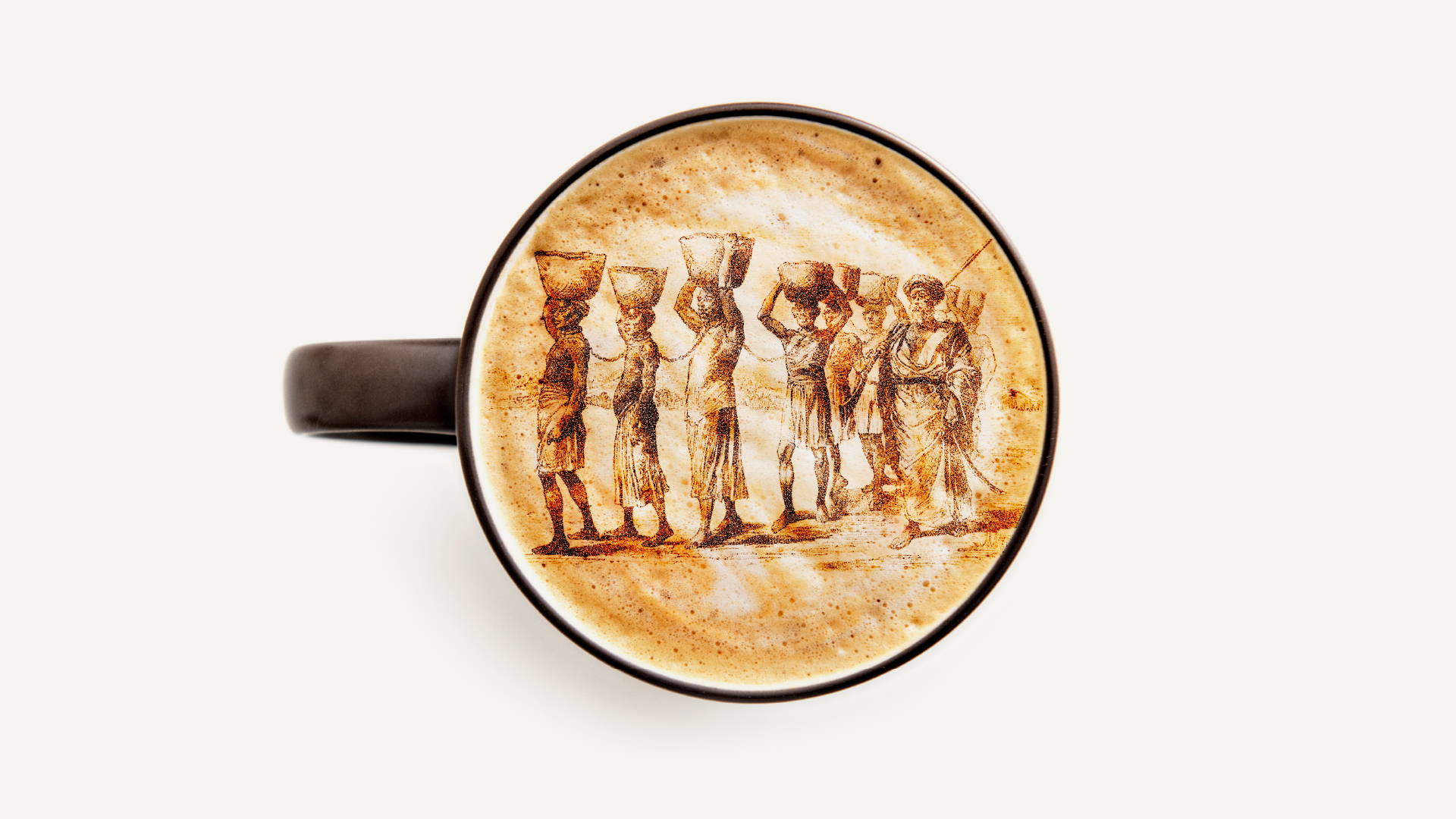The Ideal Man
(According to the Manosphere)
Many today are legitimately anxious about the future. Young men in particular see their chances for success, power and influence slipping away. Enter the online collection of communities known as the manosphere, where a variety of influencers offer a smorgasbord of solutions.
The manosphere. Red pills, blue pills, alphas, betas, sigmas. It’s a wildly successful phenomenon, with its own moral code and vocabulary. Its charismatic leaders attract millions of followers and sell millions of books.
To some it’s simply common sense. Others are less enamored. It would be easy to dismiss it as an Internet fad, but it’s clearly having real-life impact. Critics call it a toxic extremist ideology marked by resentment against women. Teachers have expressed concern over its influence on their students, and it has already attracted serious scholarly attention. Its audience is enormous across cultures worldwide.
The phenomenon demands attention—and careful consideration. What is it? Where has it come from? Why does it appeal to many and repulse others? Why now? Is there value in it? Should we celebrate it? Condemn it?
The first thing to note is that the leaders of the movement often present their statements as inarguably true. They target men, and young men in particular. The most influential voices often speak boldly and crudely. And their unapologetic, self-assured rhetoric seems to appeal.
Two academics at Australia’s Curtin University hint at the reasons why: the movement “offers explanations for, and solutions to, a very real set of issues facing young men.” It purports to address male mental health problems, loneliness, anxiety and dysfunctional relationships—all of which are current and vital concerns worldwide. The manosphere speaks most potently to the frustrated, the unsettled, the angry and the dissatisfied. “This is a disillusioned group who feel they’re getting a worse deal than in the past,” says journalist Freddie Feltham. The manosphere claims to offer rescue, release and even redemption.
The main figures within the movement are diverse. Few actually identify as part of the manosphere. Indeed, being part of a movement goes against one of their commonly held principles: individualism—a focus on self-reliance, freedom of action and personal accountability. Many therefore claim to forge their own paths. American-British influencer Andrew Tate, for example, has tried to square his moral stance with multiple bans from social media platforms for inflammatory speech that coincided with human trafficking and rape charges. He has declared, “I’m unconventional, I do not comply. . . . I’m that guy who does whatever he wants.” Many others speak similarly. The result is a populist, overlapping and often contradictory body of thought.
“Manosphere influencers promise men support and meaning. But they . . . also advance a narrow idea of masculinity that puts harmful limits on what it means to be a man.”
When grappling with new ideas, perspectives or movements, it’s important to think carefully about what’s being said, why it might appeal, and whether it has lasting value.
The Basis: Perceived Injustice
The manosphere, though not monolithic, has some central components. But they can be easy to miss amidst the bluster of its diverse leaders.
Their first appeal is hard to refute, especially when imprecisely expressed—that something has gone wrong in society. It chimes with libertarian social and political thinking that distrusts power and cultivates nostalgia for an era most have not experienced—a yearning for a time when things were “better,” whatever that might mean for the individual.
Such core ideas are presented as timeless, even moral—a battle of “good versus evil,” as Tate frames it—and they point to societal uncertainty and psychological instability across Western communities. Economic upheaval, the chasm between rich and poor, decreasing wage value, career fluidity, and divisive politics have created a situation where few people feel able to plan for the coming five years, let alone a lifetime. The idea that a young man could go to school, find a job, buy a home, marry, start a family and be settled for life by his mid-20s is unreachable for many. Short-term politics and hasty profit-seeking, coupled with dire environmental projections, make a happy future hard to envision, so it’s no wonder men are attracted by those who seem to offer solutions.
They contrast this current state of affairs with a popular perception of the mid-20th-century West, where life seemed more stable, more predictable and more affluent. Of course, to the extent that this view might be true, it excludes large parts of the world, whose resources were frequently siphoned to support that affluence. But it’s a vision some men want to reclaim: As Feltham quips, it’s “a return to the ‘golden age’—flash men, women in bikinis, physical prowess—James Bond with tattoos.”
This can be persuasive to men of older generations too, who’ve watched cherished cultures be attacked and partly dismantled as society takes on a different lens. It’s not surprising that some yearn for a return to former values.
Much of the discussion coalesces around male and female roles. The manosphere criticizes left-wing cultural movements, feminism and recently revised perspectives on gender. Some champion the “traditional male,” who suppresses so-called softer emotions and whose job is to protect and provide for women. Others use a pseudo-evolutionary logic, which promotes a similarly machismo-driven male type: the alpha male. Nearly all lament changes in female social standing over the last century or so.
“This time of instability and change has given rise to a pervasive belief that gains in rights and power for women must mean men are losing out.”
It’s a simplistic view of gender: men are providers, fathers, workers, while women exist to have children and enable male performance—in the bedroom as well as the boardroom. But marriage is not necessarily part of that equation. In fact, blogger George W. Miller (better known by his pseudonym Rollo Tomassi and called by some “the godfather of the manosphere”) advises that “marriage should be a last resort, something to be forestalled until a Man, by virtue of years of experience, has the ability to recognize with measurable accuracy, a woman who deserves what he provides her.” He adds, “After 16 years of marriage I can honestly say there are no appreciable advantages (outside of raising children) that a man cannot enjoy single that he can married. . . . Marriage is complete advantage for women with negligible, if any, benefit for men.”
Some present a more nuanced view, but many espouse exactly this. Women should just be subservient—in Tate’s words, “they are given to the man and they belong to the man”—while men can be divided into types (alpha, beta, sigma) based on largely mistaken observations of primate and wolf families.
Again, it’s an overly simplified view, though its members would consider it realistic. The alpha is promoted as powerful, wealthy, attractive to women—a “man’s man,” according to fitness influencer Chad Howse. Viewers can learn how to be an alpha by adopting personal confidence, body strength, assertive body language, verbal dominance and a hard-work ethic.
Others say that alpha status can be attained via mutual reciprocation. As psychologist Jordan Peterson puts it, “the small male can become alpha, . . . not because he expresses arbitrary power but because he’s unbelievably good at mutual reciprocation; and so he has friends, and he does things for his friends, and they do things for him” (akin to the idea of “enlightened self-interest”).
The beta, on the other hand, is a stereotypical nice guy who is weak, submissive, subordinate, and assumed to be the least attractive to women. The sigma has many similarities to the alpha but is entirely independent; he does not need people at all, whether subordinates or otherwise, except to satisfy bodily needs.

Worrisome Ideas
This worldview appeals to many as straightforward, but some would say the concept of fixed personality types is demonstrably faulty. Guardian writer Steve Rose quotes professor of digital media and gender Debbie Ging of Dublin City University: “There is very little—if any—convincing science behind the notion that personality types exist or are fixed. It’s basically a really simplistic, misguided and bio-determinist account of human behaviour.”
While some of the traits the manosphere celebrates may be admirable in the absence of additional context, the package presented is worrisome, and history gives us a clue as to why.
The alpha idea is nothing new. Even its leading proponents recognize this, presenting it as a return to a vaguely 20th-century period when gender roles were opposingly defined. But it’s actually older than that. The idea that the man should be the dominant partner has been around for millennia. Its most potent iteration is perhaps the idea of “machismo,” a Spanish-Latino idea that promotes a sense of masculine power as well as dominance over women, both physically and materially.
Machismo and its close cousin macho entered English vocabulary around the mid-20th century, but their significance dates to the time when Spanish conquistadors conquered and destroyed pre-Columbian civilizations in the region we know today as Latin America, often using rape as a weapon. Its unhappy legacy endures today. The idea of machismo has been perpetuated both culturally and theologically and has been a root of, and justification for, much male violence against women.
Some have challenged the value of male dominance in recent years. The Me Too movement, a swelling of female voices spotlighting the prevalence of sexual violence by males, brought accusations against a number of public figures. History itself is replete with negative examples of men in leadership roles, especially in their treatment of women. There have clearly been many positive examples of male leadership; but given the mounting evidence, it’s not surprising that some have come to question whether the traditional approach is as balanced as it should be.
“Feminine-coded services that ‘she’ is expected to provide to ‘him’ are emotional, social, and reproductive. . . . ‘she will give’ and ‘he will take’; otherwise, ‘she will be punished.’”
The manosphere vigorously resists challenges to male leadership by championing the physically and mentally dominant alpha type. Is there value in it? The answer is yes—and no.
Mental strength, decisiveness and clarity of purpose are all part of the manosphere’s ideal-masculinity package, and there’s little to be said against that; indeed these are valuable traits for any person. But the manosphere’s approach is to adopt and twist what is admirable into something much less so.
Biblical wisdom has been exploited and pulled out of shape for millennia, so the manosphere’s perspective is just another distortion. Its response to feminism has been to promote an extreme opposite: Men are providers; women are their talentless foils; and gender equality has produced unhappy societies. This idea embraces perspectives that have been found wanting throughout history.
Selfish Ambition
Yet the manosphere is not merely a return to the past. It’s also very much a product of our time—a response to current economic and social conditions, as well as to perceptions of feminism. It has been aided by cultural Internet bubbles, which intensified social isolation in the COVID-19 crisis.
It has also grown out of a particular social moment. The 1970s (the “Me” Decade, in Tom Wolfe’s infamous words) produced a wave of alternative therapies and health solutions. These transformed over the years into extreme interpretations of otherwise legitimate concepts such as self-care, self-esteem, mindfulness and mental health.
Half a century of focusing on self-actualization—which, ironically, is also a key element in feminist ideas—has played a huge role in the manosphere. It’s what podcaster Lewis Howes is channeling when he talks about “unleashing your inner greatness.” Self-awareness can be helpful for identifying character flaws. However, the manosphere takes this in different directions and demonstrates how it can go awry. When misunderstood and misused, self-actualization fails to benefit anyone but the self.
Part of the manosphere’s appeal is in its practicality. It says, in effect, that you can take control of your life and become a success through self-focus, mutual reciprocity, hard work, or by simply making lots of money (through ethical means or otherwise).
“There’s two important factors when it comes to being financially successful. The first one is you [expletive] need to learn how to control women. . . . I tell you how to control women. Absolutely.”
Feltham believes Tate’s appeal is rooted in “his offer that ‘you too can be like me.’” Tate recommends self-analysis: “How did I get here? What did I do? What did I say?” regardless of external factors. Peterson, for his part, assures his followers that “a good person isn’t harmless; a good person . . . is capable of anything but is willing to hold that in abeyance.”
The manosphere sees the world as individuals working for themselves. In order to succeed, say its advisers, you must recognize that no one is going to help you, so you must help yourself. You must assert your capacity for free speech and action and take responsibility for what you do. Howes suggests that Peterson’s definition of greatness is captured in one word: responsibility. Tate says, “You can make a bunch of money, but you need to take responsibility and do it,” implying that you are master of your own world and of your future.
It sounds great on the surface, but the assumption is that nothing external can impede that: everything you are is your own doing. Peterson says, “People are most disappointed in life when they’re disappointed in themselves.” This is not to say that self-improvement is inadvisable; far from it. But the view that there are no influences besides the self is faulty.
Self-control and self-analysis are valuable skills. Acknowledging responsibility for your actions is a beneficial habit. Again, these principles are not new and are found in multiple places, including the Bible. But the manosphere packages them in extreme ideas that largely exclude other people, raising serious questions about their viability in the context of healthy relationships. As a rejection of cooperative thinking and action, it minimizes the value of trust, generosity and empathy.
The extreme iteration of this mindset is the sigma male, the man who “thinks for himself” and needs nobody. It doesn’t take much imagination to apply the sigma type to Anders Breivik or Elliot Rodger—young, independently thinking men who certainly made a difference in the world, but not in a way that anyone would want. Social isolation generates many unwelcome physical and psychological consequences, so it’s disturbing to see it celebrated as an ideal.

Money and Sexual Satisfaction
Complete separation from humanity isn’t the goal of the manosphere, though. Their version of success does include other people, primarily for two purposes: money and sexual satisfaction.
Regarding the first, Internet personality Justin Waller says, “If we’re not making money together, I don’t wanna be your friend.” Being alpha is, for some, synonymous with wealth. It brings a stress-free life, according to Aaron “Alpha M” Marino. It comes by your own hard work as well as by exploiting the people around you. Almost every leading figure in the manosphere has a rags-to-riches story. They present themselves as role models, and it’s persuasive. In an article published in The Guardian, Feltham quotes Enys Kelmeni, a Tate “megafan,” who told him that “becoming financially successful made you a ‘high-value’ male. Anything less is failure.”
It’s a natural conclusion in a capitalist society. It’s also tremendously harmful. Seeing the world through the lens of money damages relationships, families and communities. It marginalizes more enduring values such as love, cooperation, compassion and peacemaking, all of which are less lucrative than their opposites. For those who are financially unsuccessful, it can provoke feelings of depression or inferiority and contribute to serious health issues. It renders the retired and elderly worthless. Far from creating happiness, it damages lives in all sorts of spheres. And no wonder; long ago, the Bible noted that “the love of money is a root of all kinds of evil.”
But money, and the power that comes with it, are important to the manosphere. Money and power attract women, supposedly as a natural consequence of being alpha. “Generally, alpha males have people pursuing them and have their share of mates to select from,” says one website. Others say that their attractiveness is not necessarily tied to wealth but rather to a “dominant” mindset, which they believe attracts women. “There are influential men that rise to the top, and the women take them,” Peterson argues. “Dominance hierarchy is a mechanism that selects heroes and then breeds them.” He seems unaware that, as we noted earlier, the concept of the alpha male in the animal kingdom is mistaken, and there are multiple challenges in applying it to human behavior. Humans have long benefited from social norms valuing cooperation and egalitarianism, although selfish acts of domination and aggression often prevail.
Such aggression isn’t good news for women. Sexual satisfaction—the manosphere’s other primary reason to engage with others—is seen as a man’s need and right, to the point that a man may forcefully demand it if it’s not provided willingly. Being seen as sexually successful is deemed important, so having multiple female sexual partners is a common aim. The same behavior in women, however, is vilified, along with female displays of emotional need. YouTube influencer Casey Zander says that “sexual alphas don’t need commitment. If you need commitment, if you need love, if you need intimacy, these are beta male traits.” He goes on to claim that women are involuntarily attracted to men with multiple partners. In a culture that doesn’t value love and commitment, male-female relationships are reduced to economic and antagonistic exchanges.
“The manosphere has its own version of evolutionary psychology, mingling cutting-edge scientific theories and hypotheses with personal narratives, sexual double standards and misogynistic beliefs.”
Frustration of that perceived sexual right has created the self-styled “incel,” (short for involuntarily celibate) who allegedly is a victim of a society warped by feminism and unattainable standards. Pick-up artists, or PUAs, attempt to counter that, offering tricks and techniques to attract women—often for a fee, again demonstrating that personal success and making money are paramount within the manosphere. Much of this goes hand in hand with alpha coaching, further encouraged by violent pornographic tropes. The result is a queasy, disturbing attitude toward women and intimate relations. As manosphere fan Kelmeni says, chillingly, “You women out there, you like a man who’s controlling, and you know that.”
Stability and Self-Sufficiency
Several elements already discussed coalesce in a third critical theme within the manosphere: stability and self-sufficiency. In an uncertain world with a murky future, stability is understandably appealing. So what the manosphere recommends (shutting out others’ opinions, focusing on what you can control, and working on your strengths) might seem a feasible path toward a stable personal life. It may even be couched in noble terms, emphasizing that self-sufficiency comes by hard work and by establishing a career.
Another focus includes the psychological benefits of fitness and bodybuilding, which some recommend as a way to build confidence. When approached for advice by a clinically depressed and suicidal man, Tate’s response was: “Listen, go to the gym. Get a six-pack first. Once you’ve got a six-pack, email me again. If you still feel like killing yourself, I don’t know what else to say to you.” The manosphere in general promotes bodybuilding as an aid to projecting assertiveness, defending the self and protecting the family—again, key male responsibilities within that community.
One can also establish stability by obtaining a family, they say. “A life without children is vapious [sic], and it’s inane, and it’s pointless,” Tate asserts. Peterson speaks about work being a “utility” that can enable a family, giving you “something to do” in your later years. “It’s a barren future without children, man,” he says. For Tate, children are an opportunity to self-replicate: “I’m having a child so it has my name and it acts like me.” He also believes in having many children with as many women as desired. This echoes a certain evolutionary perspective—that reproduction is about perpetuating the species, and in particular one’s own identity.
The idea of dedicating a family’s love, care, achievements and education to the father’s identity and stability reduces other members of the family to mere tools or resources. Within the manosphere, though, it makes perfect sense. It’s how an individualist sees the world around him, so why not his family as well? His freedom, in both word and action, trumps other values.
“Incels, Men’s Rights Activists (MRA) and Pick-Up Artists (PUA) . . . all draw on the same underlying belief in male victimhood—specifically that women and feminism are at fault for the ‘lowly’ status at which modern men find themselves.”
This disturbing view of one’s place among other people is where the manosphere is on the shakiest of shaky ground and where feminists’ objection has its strongest justification. Extreme self-focus is harmful to others and, as a result, is ultimately self-destructive. It’s the opposite of a caring, kind and generous mindset, where one person seeks to assist others.
This is perhaps the manosphere’s most concerning tragedy. Its success derives a great deal from the fact that it connects to legitimate concerns among young men. It promises success, power and influence to those who have cause to yearn for it. Many today are suffering, frustrated, uncertain and worried about the future. The manosphere claims to have answers, but the proffered solutions are based on faulty principles.
This is a useful test case for critical thinking, which we all must engage in. You may hear things that overlap or run parallel with what is true. For instance, the manosphere believes there’s something wrong with society, and they’re right, although their diagnosis and solutions are not. You might disagree with the manosphere’s critics, but it doesn’t necessarily follow that the manosphere is therefore correct. Some of its rhetoric may even resonate with you, but again, that doesn’t make it true. Even if you agree with 5 percent of what a speaker, influencer or thought leader says, it’s important not to get carried along with the other 95 percent.
The influences coming across your social media feed can echo the ancient tree that represents a dangerous mix of truth and falsehood, Eden’s tree of the knowledge of good and evil: alluring, yet capable of fueling catastrophic decisions. Careful, sober thinking is of paramount importance. As humans we have a poor record of telling truth from fiction, and our mental apparatus for doing so has proved inadequate again and again. It’s especially difficult when what we encounter is, to say the least, a mixed bag.
The manosphere presents an enticing package of solutions. Within is some worthwhile advice. Whatever value that has, though, is strangled by its underlying mindset, which is self-centered, acquisitive, aggressive and antagonistic. Its frequent references to the Bible—Tate believes he’s on a godly mission—are both ironic and tragic, because the mindset so often clashes with what the Bible actually says. Profound matters such as mercy, love and compassion seem entirely absent.
Is an aggressive and selfish mindset that devalues women and is perpetually seeking to outdo other men really the way to a peaceful, flourishing life? And is this really the manifestation of the ideal man?



